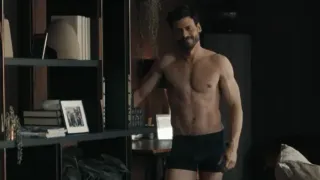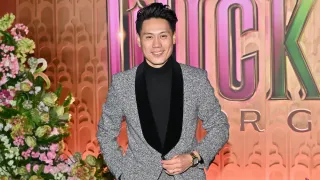July 31, 2024
EDGE Interview: Newcomer Ruaridh Mollica on Playing Queer Sex Worker in Provocative 'Sebastian'
Frank J. Avella READ TIME: 14 MIN.
EDGE: It seems like you found that balance between feeling safe and also being allowed to take risks.
Ruaridh Mollica: Totally, yeah. I definitely wouldn't have been comfortable taking risks if I hadn't felt so safe. At the start, it was very much like, "I need to know exactly where that person's hand is going to be. I need to know exactly what's going to happen." And then as you build trust with the other actor, there's maybe room for a little bit more improvisation, within a very specific field. But it allowed things to come to life a little bit more under the guidance of the intimacy coordinator.
EDGE: Very different from, say, films of the '70s like "Don't Look Now," with its famous sex scene. You have to wonder how coordinated that was.
Ruaridh Mollica: I've worked with some older actors and talked to them about intimate scenes and a lot of them say that back then it was like, "Well, just take your clothes off and get at it." The director was just like, "Go, do it now." There'd be no warm-up... I think back in the day when there was no closed set, people managed, but I don't think it's as safe, or you can build anything authentically, without an intimacy coordinator.
EDGE: A lot has been written about the importance of queer artists telling queer stories. But as an actor, shouldn't you be free to play any role, within reason?
Ruaridh Mollica: Yeah. This is always a conversation that I have different thoughts about depending on what I see and what it is. For a while, I firmly believed that just queer actors should play queer roles, mainly in terms of the sensitivity and the understanding of the topics. But now I do believe as long as the actor is an ally and perhaps has friends in the community and as long as the filmmakers are queer – someone, the writer, director – I think it's more important that they are getting to tell their stories. And if they see that an actor that they like is perfect for telling their story, as a queer person, I think that is probably one of the most important things. But I do agree that if you can cast queer, you should cast queer; if you can cast trans, you should definitely cast trans.
EDGE: On the audience side, as somebody who's gay or bisexual now – we're getting bisexual stories which is great. It's always nice to look up the actor and not find out that he's straight and married and has children.
Ruaridh Mollica: (laughs) Totally, totally. And it gets so interesting as well, because sometimes, off the bat, if they're married and have children, I'm like, "Well, they must definitely be straight." But then I have to understand that – I mean, I'm bisexual – but people who are bisexual may have found love with a woman, and that's also wonderful. But it is the people who have come out as openly straight and do keep doing queer roles, I'm like, "Okay, do one, maybe... and then, throw in the towel!"
EDGE: Agreed. "Too Rough" was an exceptional short film you made, and you were amazing in it.
Ruaridh Mollica: Thank you. "Too Rough" was really the beginning of everything for me. I'd done a few things when I was young but then I'd went to university and I did a whole other degree, and it was in my final year doing my dissertation that I got the audition for "Too Rough." And I just went for it. We shot it in four days. And that was what really awakened the cathartic passion for acting again. It was like, "Oh my god, this is work and I feel so happy doing it." That film was probably one of the main films that was a catalyst for me coming out. I hadn't really addressed it. I was at a semi-sports science university. It was a very straight place to be. And that film was definitely the beginning of that, and the beginning of my deciding to pursue acting.
EDGE: Who are your film heroes?
Ruaridh Mollica: Oh, Andrew Haigh, I love. Luca Guadagnino... I really love Willem Dafoe. He always does such cool, interesting, freaky stuff. And Francis McDormand, in terms of someone who is just the most natural, incredible performer. "Nomadland" is one of my favorite films of all time. I'd love to work with her. And Eliza Hitman. "Beach Rats" was something I watched when I was preparing for "Sebastian." And the Duplass Brothers. Their approach to filmmaking, no matter your budget, just roll up your sleeves, write it and do it. I really respect that.
EDGE: You mentioned "Beach Rats" and I was reminded that someone recently called you the Italian Harris Dickinson.
Ruaridh Mollica: (laughs) No way? Oh, that feels good. I'll take that any day!
"Sebastian" opens theatrically on August 2 in San Francisco, Los Angeles, and New York City. For more on the film, click here.
Check out these pics from Mollica's Instagram:






